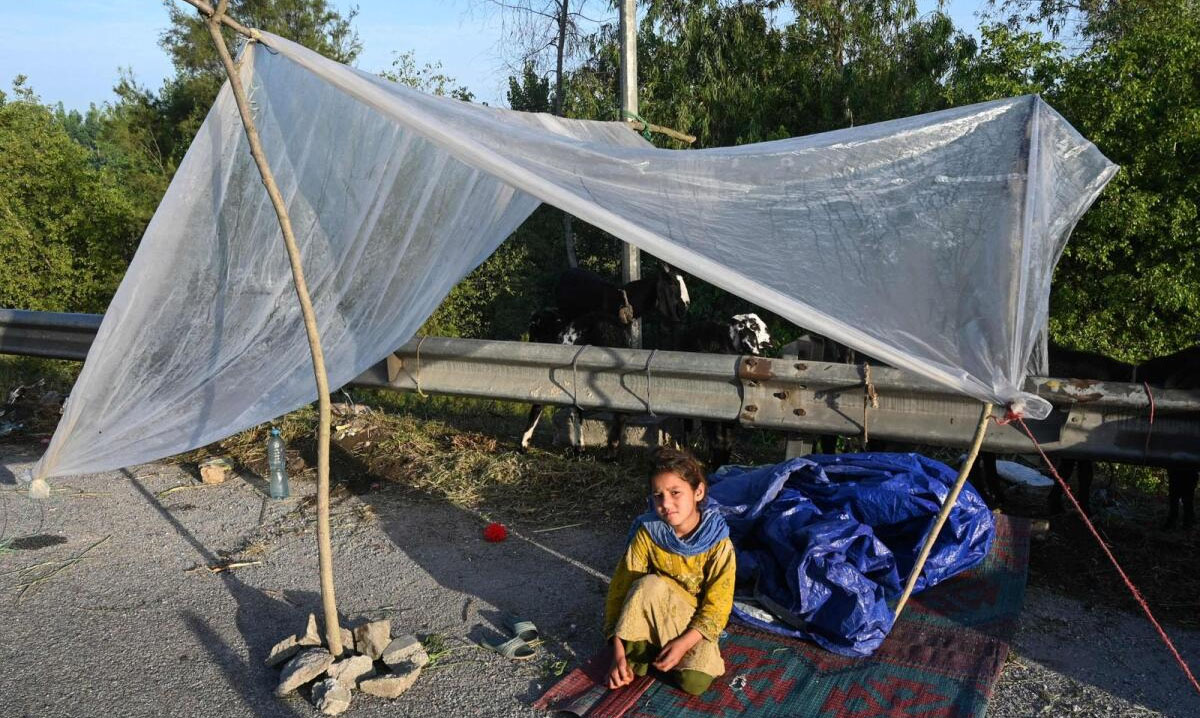International
Russia-Ukraine updates: Ukrainian forces preparing Luhansk offensive

Ukrainian forces have said they are making gains in the direction of Luhansk. Meanwhile, British intelligence has said Russia “almost certainly” moved parts of its submarine fleet out of Crimea. DW rounds up the latest.
Ukraine said its troops are continuing to make gains moving eastward toward the Russian-occupied Donbas region, setting the stage for a push to potentially recapture parts of Luhansk province.
International
JUST IN: Court orders Mohbad’s wife to do DNA test

JUST IN: Court orders Mohbad’s wife to do DNA test
A Magistrate Court sitting in the Ikorodu area of Lagos has ordered that singer late Mohbad’s wife, Wunmi, be served notice of a pending DNA test application, by substituted means.
A statement signed by a member of the legal team to the Aloba family, Monisola Odumosu, disclosed this on Wednesday, April 17.
Mohbad’s father, Joseph Aloba, in the application filed by the legal team to the family sought an order to serve Wunmi by posting all the originating processes and other processes in the suit on the last-known address of the respondent.
READ ALSO:
- BREAKING : EFCC declares Yahaya Bello wanted, seeks information on his whereabout
- Chioma attends Davido’s concert amid hubby infidelity allegation
- Court fixes May 9 for Agunloye’s ₦1bn suit against EFCC
The statement revealed that the legal team led by Emmanuel Oroko had argued that the sheriff had attempted twice to serve Wunmi the court process but failed.
“If the process were served on the last-known address of the respondent by Order of the Court, it would constitute good service and she would be aware of the pending suit.
The Chief Magistrate granted the order and ordered that the respondent be served by posting the court process on her last known address.
It will be recalled that the Aloba family is contesting the paternity of baby Liam and filed an application before the Family Court wherein it sought an order of the court against Wunmi to present herself and baby Liam for a DNA test at any recognised laboratory in Lagos,” Odumosu said.
JUST IN: Court orders Mohbad’s wife to do DNA test
International
Israel halts plan to carry out retaliatory strike on Iran

Israel halts plan to carry out retaliatory strike on Iran
Israel considered carrying out a strike on Iran in retaliation for last weekend’s unprecedented attack but aborted the plan following discussions with Washington, according to Israeli and US media reports.
Iran launched more than 300 drones and missiles over the weekend in an unprecedented attack on Israel.
The strikes, which Tehran telegraphed to Western and regional officials, caused little damage with most of the projectiles being intercepted, but signalled a momentous shift in the Islamic Republic’s rules of engagement.
Israeli Prime Minister Benjamin Netanyahu vowed to respond to the attack, prompting global powers, including main ally the United States, to call for restraint to avoid any further escalation or regional spillover from the months-long war in Gaza.
Israeli public broadcaster Kan reported that following discussions with US President Joe Biden, Netanyahu decided not to proceed with pre-arranged plans for retaliatory strikes on Iran in the event of an attack.
‘Diplomatic sensitivities came into play,’ a senior Israeli official speaking on condition of anonymity told Kan, adding that there would be a response, but that it would be different from what was initially planned.
Citing three unnamed Israeli sources, ABC News reported: ‘Israel prepared for and then aborted retaliatory strikes against Iran on at least two nights this past week.’
Among the range of possible reactions considered by the Israeli war cabinet were options to attack Iranian proxies elsewhere in the region or to conduct a cyberattack, the sources told ABC.
READ ALSO:
- JAMB to security agents: Arrest any parent who comes near CBT centres
- Kaduna assembly speaker warns el-Rufai’s son over threats of lawmakers
- We’ve stopped paying fuel subsidy, FG replies el-Rufai
At a cabinet meeting on Monday, Israeli officials considered giving the Israel Defence Forces (IDF) permission for a strike against Iran, but ‘for operational reasons’ decided not to go ahead with it, two unnamed Israeli officials told US news outlet Axios.
Iran-backed armed groups across the region have carried out attacks since the Israel-Hamas war broke out in October.
Tehran’s weekend onslaught, its first direct assault on Israeli soil, came in response to a deadly strike on Iran’s consular annex in Damascus on April 1 that was widely blamed on Israel.
Washington and Brussels have pledged to ramp up sanctions against Iran, while Iran’s president has warned of ‘a fierce and severe response’ to any retaliation.
In response to the diplomatic pressure, including from main military backer Washington, Netanyahu on Wednesday insisted Israel will make its own decisions, and ‘do what it needs to defend itself’.
The comments come after Benny Gantz, Israel’s former defence minister and a member of the War Cabinet, said cryptically that Tel-Aviv ‘will collect the price from Iran, in the way and at the time that suits us’.
Many analysts said Iran’s strike – while measured and easily managed by Israeli air defences – changed its rules of engagement in its decades long shadow war with Israel – a shift that must precipitate an Israeli response.
RUSI associate fellow and defence analyst Samuel Cranny-Evans told MailOnline: ‘Iran has deviated from its usual strategy of using proxies to exert influence and conduct conflict in the area and moved to direct state-on-state confrontation.
‘The dynamics have changed and made the risk of conflict greater – both between Israel and Iran, and in the wider region.
‘Israel has and can act independently (of the US) – they have to do something to restore deterrence… Netanyahu is all about security, and in the context of Hamas‘ October 7 attacks is unlikely to want to be seen as weak in the face of Iranian aggression.’
Former Israeli intelligence officer Avi Melamed told MailOnline that Tel-Aviv would seek to exact some kind of cost from Iran, arguing that such a strike cannot go unpunished lest Israel be seen as more vulnerable by its foes.
‘Iran is watching to see if Israel is capable of mounting a response, and a failure to do so will result in added risk for Israel of future attacks from Iran and other enemies,’ he said.
READ ALSO:
- Why we exclude private varsity students from loan scheme – FG
- Troops rescue another Chibok girl with three children in Borno
- Pandemonium at a busy bus stop as cultists gun down revenue collector
These comments were echoed by Ari Sacher, senior policy advisor at the U.S. Israel Education Association.
‘It’s imperative for Israel to respond here. De-escalation is a suboptimal path forward so long as Iran and its proxies fail to recognize Israel as a sovereign nation… A purely defensive stance by Israel against Iran’s attacks will continue this cycle of aggression, leaving Israel strategically vulnerable and emboldening the Islamic Republic.’
One likely course of action would see Israel step up its strikes on Iran’s proxy forces.
It was an Israeli strike in Damascus that prompted Sunday’s attack from Iran – but several IRGC officers were killed, including two Quds force generals.
More intense strikes on Hezbollah in Lebanon, the Houthis in Yemen and targets elsewhere that are linked to Iran could demonstrate Israel’s willingness and military capability to Tehran, without risking any more Iranian lives.
A large-scale cyber attack might be equally effective in demonstrating Israel’s capabilities without causing casualties.
Meanwhile, any targeted attacks by Israel on Iranian soil – particularly kinetic strikes with drones or missiles – would undoubtedly trigger another response of greater magnitude from Tehran.
However, Justin Crump, British army veteran and CEO of global risk analysis firm Sibylline, said escalation may benefit Netanyahu, arguing that the prospect of major conflict with Iran reduces the political pressure over Israel’s war in Gaza.
Prior to Iran’s attack, the Israeli Prime Minister was facing a torrent of international criticism amid a rapidly increasing Palestinian death toll in Gaza, the deaths of seven aid workers following an Israeli drone attack, and outcry over a planned military incursion into the southern Gazan city of Rafah.
‘Permacrisis suits Netanyahu at this stage,’ Crump told MailOnline.
‘This situation has certainly helped Israel and its leadership, reversing the trend of pressure over Gaza and helping defuse some political tensions that were once again building.
‘It is to be expected that Netanyahu will leverage this environment. The Israeli public stance from the War Cabinet will therefore remain belligerent, whatever goes on behind the scenes.’
Israel halts plan to carry out retaliatory strike on Iran
dailymail
International
Heavy downpours, lightning kill 65 in Pakistan

Heavy downpours, lightning kill 65 in Pakistan
At least 65 people have perished in storm-related accidents in Pakistan, including lightning, according to officials, with rain falling at roughly twice the historical average rate in April.
Heavy rains between Friday and Monday produced flash floods and collapsed houses, while lightning killed at least 28 people.
The highest death toll occurred in northwestern Khyber Pakhtunkhwa, where 32 people, including 15 children, died and more than 1,300 homes were damaged.
“All the casualties resulted from the collapse of walls and roofs,” Anwar Khan, spokesman for the province’s disaster management authority, told AFP on Wednesday.
Villagers whose homes were inundated with water were forced to seek refuge on higher ground, including on the shoulders of motorways, creating makeshift tents with plastic sheeting and bamboo sticks.
“In April, we have observed highly unusual rainfall patterns,” Zaheer Ahmad Babar, spokesperson for the Pakistan Meteorological Department, told AFP.
“From April 1st to April 17th, we experienced precipitation levels exceeding the historical average by 99 percent,” he added, citing data from the past 30 years as a comparison.
READ ALSO:
- EFCC has no powers to prosecute people over naira abuse – Odinkalu
- Stop Wike from using PDP for relevance, Secondus tells party leaders
- Court affirms Ganduje’s suspension as APC member
Most of the country experienced a pause in rain on Tuesday and Wednesday, but more downpours are predicted in the coming days.
“Climate change is a major factor behind these unusual weather patterns and above normal rainfalls, but it’s not just Pakistan which is affected, the whole region is experiencing changes in temperature patterns,” Babar added.
Pakistan is increasingly vulnerable to unpredictable weather patterns, as well as often destructive monsoon rains that usually arrive in July.
In the summer of 2022, a third of Pakistan was submerged by unprecedented monsoon rains that displaced millions of people and cost the country $30 billion in damage and economic losses, according to a World Bank estimate.
In the latest rains, 21 people including farmers harvesting wheat were killed by lightning in Punjab, Pakistan’s most populous province, provincial authorities said.
At least eight people were killed in Balochistan province, including seven struck by lightning, where 25 districts were battered by rain and some areas were flooded.
People living in open, rural areas are at greater risk of being struck by lightning during thunderstorms.
Schools in Balochistan province were ordered shut on Monday and Tuesday, with some reopening on Wednesday, because of the downpours.
At least four people were killed in road accidents linked to flooded roads in southern Sindh province.
Heavy downpours, lightning kill 65 in Pakistan
(AFP)
-

 Sports7 days ago
Sports7 days agoKane’s three children involved in car crash, hospitalised
-

 News5 days ago
News5 days agoFG gives update on where fleeing Binance executive is hiding
-

 Entertainment6 days ago
Entertainment6 days agoTolani Baj expresses love for Bobrisky
-

 metro5 days ago
metro5 days agoTroops neutralise 188 terrorists, rescue 133 hostages in assault operations
-

 metro5 days ago
metro5 days agoViral video: Edo CP orders trial of officer threatening people with gun
-

 News5 days ago
News5 days agoNLC, TUC jointly propose N615,000 new minimum wage
-

 News7 days ago
News7 days agoNew electricity tariff may drop if naira rebounds further – Adelabu
-

 metro6 days ago
metro6 days agoBreaking: Bobrisky sentenced to six months imprisonment without option of fine






















